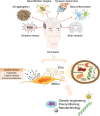Mesenchymal stem cell- and extracellular vesicle-based therapies for Alzheimer's disease: progress, advantages, and challenges
- PMID: 36751774
- PMCID: PMC10154491
- DOI: 10.4103/1673-5374.361546
Mesenchymal stem cell- and extracellular vesicle-based therapies for Alzheimer's disease: progress, advantages, and challenges
Abstract
Alzheimer's disease is a severe, highly disabling neurodegenerative disease, clinically characterized by a progressive decline in cognitive functions, and is the most common form of dementia in the elderly. For decades, the search for disease-modifying therapies has focused on the two main Alzheimer's disease histopathological hallmarks, seeking to prevent, mitigate, or clear the formation of extracellular aggregates of β-amyloid peptide and intracellular neurofibrillary tangles of tau protein, although without clinical success. Mesenchymal stem cell-based therapy has emerged as a promising alternative for the treatment of Alzheimer's disease, especially because it also targets other crucial players in the pathogenesis of the disease, such as neuroinflammation, synaptic dysfunction/loss, oxidative stress, and impaired neurogenesis. Herein, we review current knowledge of the therapeutic potential of mesenchymal stem cells and their extracellular vesicles for Alzheimer's disease, discussing the most recent findings in both preclinical and clinical trials as well as how advanced technologies have helped to overcome some limitations and contributed to stimulate the development of more effective treatments.
Keywords: Alzheimer´s disease; amyloid-β; cell therapy; cell transplantation; exosomes; extracellular vesicles; mesenchymal stem cell; micro vesicles; neuroinflammation; tau protein.
Conflict of interest statement
None
Figures

References
-
- Alvarez-Erviti L, Seow Y, Yin H, Betts C, Lakhal S, Wood MJ. Delivery of siRNA to the mouse brain by systemic injection of targeted exosomes. Nat Biotechnol. (2011);29:341–345. - PubMed
-
- Bodart-Santos V, de Carvalho L, de Godoy MA, Batista AF, Saraiva LM, Lima LG, Abreu CA, De Felice FG, Galina A, Mendez-Otero R, Ferreira ST. Extracellular vesicles derived from human Wharton's jelly mesenchymal stem cells protect hippocampal neurons from oxidative stress and synapse damage induced by amyloid-βoligomers. Stem Cell Res Ther. (2019);10:332. - PMC - PubMed
Publication types
LinkOut - more resources
Full Text Sources

